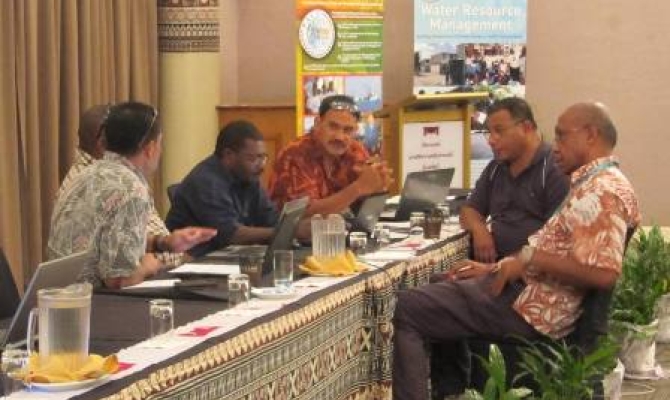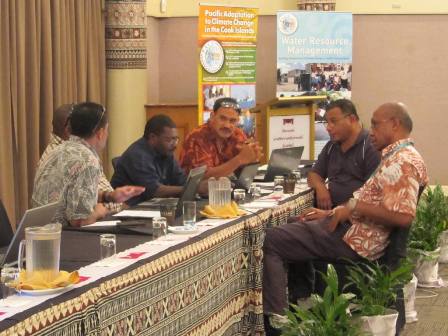
Climate Change Resilience
Participants at the annual review meeting of the Pacific Adaptation to Climate Change (PACC) project shared their most promising innovations during a highlight session of the meeting held in Nadi from 12 to 16 August. Drawing on experiences in the 14 PACC country projects, the session included presentations on a 'Coastal Calculator' developed in the Cook Islands, participatory 3-D mapping used in Vanuatu, and the input of community facilitators or 'champions' in Fiji, among others.
 Now in its fourth year, emphasis in the PACC project is moving towards sharing of such innovations to promote replication and up-scaling.
Now in its fourth year, emphasis in the PACC project is moving towards sharing of such innovations to promote replication and up-scaling.
"The projects are producing a wealth of experience, lessons and innovations," said Regional Project Coordinator Taito Nakalevu. "Our task now is to capture and share these throughout the region. This will be one of the key activities for the next 18 months."
The showcased tools illustrate the diversity of the PACC project. The Cook Islands Coastal Calculator is a tool to help with designing climate-proof infrastructure. In the Cook Islands, where the PACC project is assisting with design and building of a harbour on Mangaia Island, the Coastal Calculator will help ensure that the harbour can withstand assault from cyclones and storm surges well into the future. The 3-D mapping tool, by contrast, is an aid to engaging communities and enabling their participation in decision making. In the Vanuatu project, this has been used in deciding on whether to relocate roads and villages further inland. Meanwhile, in Fiji, engaging community facilitators as a link between the project team and communities has proven to be a masterstroke, enhancing community ownership as well as sustainability of the project.
"We will be gathering and documenting these tools into a 'PACC toolbox'," said Gabor Vereczi, UNDP Regional Technical Advisor and member of the PACC Project Board. "One aim of the PACC project is to lay foundations for successful adaptation in the region, and these tools are an important part of that."
As the PACC project enters its final 18 months, the review meeting was preoccupied with consolidating experiences and results thus far and ensuring up-scaling and sustainability of achievements beyond the end of the project.
The PACC project is a partnership between several key regional agencies and national agencies and communities in 14 Pacific island countries and territories. It is funded by the Global Environment Facility (GEF) Special Climate Change Fund (SCCF) and the Australian Government (AusAID), with the United Nations Development Program (UNDP) as its implementing agency and the Secretariat of the Pacific Regional Environment Programme (SPREP) as regional implementing partner.

PACC Coordinators at the recent meeting
"The projects are producing a wealth of experience, lessons and innovations," said Regional Project Coordinator Taito Nakalevu. "Our task now is to capture and share these throughout the region. This will be one of the key activities for the next 18 months."
The showcased tools illustrate the diversity of the PACC project. The Cook Islands Coastal Calculator is a tool to help with designing climate-proof infrastructure. In the Cook Islands, where the PACC project is assisting with design and building of a harbour on Mangaia Island, the Coastal Calculator will help ensure that the harbour can withstand assault from cyclones and storm surges well into the future. The 3-D mapping tool, by contrast, is an aid to engaging communities and enabling their participation in decision making. In the Vanuatu project, this has been used in deciding on whether to relocate roads and villages further inland. Meanwhile, in Fiji, engaging community facilitators as a link between the project team and communities has proven to be a masterstroke, enhancing community ownership as well as sustainability of the project.
"We will be gathering and documenting these tools into a 'PACC toolbox'," said Gabor Vereczi, UNDP Regional Technical Advisor and member of the PACC Project Board. "One aim of the PACC project is to lay foundations for successful adaptation in the region, and these tools are an important part of that."
As the PACC project enters its final 18 months, the review meeting was preoccupied with consolidating experiences and results thus far and ensuring up-scaling and sustainability of achievements beyond the end of the project.
The PACC project is a partnership between several key regional agencies and national agencies and communities in 14 Pacific island countries and territories. It is funded by the Global Environment Facility (GEF) Special Climate Change Fund (SCCF) and the Australian Government (AusAID), with the United Nations Development Program (UNDP) as its implementing agency and the Secretariat of the Pacific Regional Environment Programme (SPREP) as regional implementing partner.